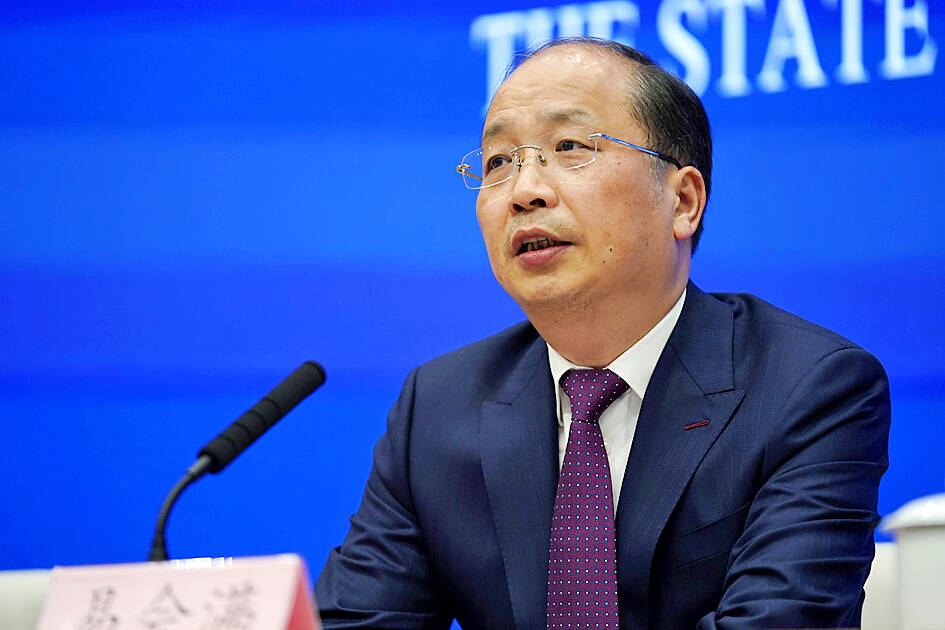China has removed the head of its top financial regulator, state media reported yesterday, after markets in the world’s second-largest economy have been among the worst-performing globally in recent months.
Beijing has become increasingly worried about the sell-off on markets in Shanghai and Hong Kong, which has wiped trillions off valuations, and has unveiled a string of measures to try to staunch the rout.
State broadcaster CCTV yesterday said the top leadership of the Chinese Communist Party removed Yi Huiman (易會滿) from his position as chief of China’s Securities Regulatory Commission (CSRC), the country’s top financial regulator.

Photo: EPA-EFE
That came a day after, according to Bloomberg, Chinese President Xi Jinping (習近平) was due to meet with regulators to discuss efforts to lift the markets.
Yi, a former chairman of the Industrial and Commercial Bank of China (中國工商銀行), was appointed to the top job at CSRC in January 2019.
Wu Qing (吳清), a banking and regulation veteran who earned the reputation as “the broker butcher” when he led a crackdown on traders in the mid-2000s, is replacing Yi, the official Xinhua News Agency reported.
China, which recorded one of its lowest growth rates in three decades last year at 5.2 percent, has been hammered by a crippling property crisis, sluggish consumption and global turmoil, and officials have been under pressure to unveil more stimulus measures to kickstart business activity and get consumers spending again.
On Tuesday, stocks in Hong Kong and Shanghai soared after Central Huijin Investment Ltd (中央匯金) — the unit that holds Chinese government stakes in major financial institutions — said it would increase investments in funds.
That was followed by an announcement from the CSRC that it would urge more action from long-term funds and call on listed firms to ramp up re-purchase.
Shanghai stocks extended their rally yesterday.

MULTIFACETED: A task force has analyzed possible scenarios and created responses to assist domestic industries in dealing with US tariffs, the economics minister said The Executive Yuan is tomorrow to announce countermeasures to US President Donald Trump’s planned reciprocal tariffs, although the details of the plan would not be made public until Monday next week, Minister of Economic Affairs J.W. Kuo (郭智輝) said yesterday. The Cabinet established an economic and trade task force in November last year to deal with US trade and tariff related issues, Kuo told reporters outside the legislature in Taipei. The task force has been analyzing and evaluating all kinds of scenarios to identify suitable responses and determine how best to assist domestic industries in managing the effects of Trump’s tariffs, he

TIGHT-LIPPED: UMC said it had no merger plans at the moment, after Nikkei Asia reported that the firm and GlobalFoundries were considering restarting merger talks United Microelectronics Corp (UMC, 聯電), the world’s No. 4 contract chipmaker, yesterday launched a new US$5 billion 12-inch chip factory in Singapore as part of its latest effort to diversify its manufacturing footprint amid growing geopolitical risks. The new factory, adjacent to UMC’s existing Singapore fab in the Pasir Res Wafer Fab Park, is scheduled to enter volume production next year, utilizing mature 22-nanometer and 28-nanometer process technologies, UMC said in a statement. The company plans to invest US$5 billion during the first phase of the new fab, which would have an installed capacity of 30,000 12-inch wafers per month, it said. The

Taiwan’s official purchasing managers’ index (PMI) last month rose 0.2 percentage points to 54.2, in a second consecutive month of expansion, thanks to front-loading demand intended to avoid potential US tariff hikes, the Chung-Hua Institution for Economic Research (CIER, 中華經濟研究院) said yesterday. While short-term demand appeared robust, uncertainties rose due to US President Donald Trump’s unpredictable trade policy, CIER president Lien Hsien-ming (連賢明) told a news conference in Taipei. Taiwan’s economy this year would be characterized by high-level fluctuations and the volatility would be wilder than most expect, Lien said Demand for electronics, particularly semiconductors, continues to benefit from US technology giants’ effort

‘SWASTICAR’: Tesla CEO Elon Musk’s close association with Donald Trump has prompted opponents to brand him a ‘Nazi’ and resulted in a dramatic drop in sales Demonstrators descended on Tesla Inc dealerships across the US, and in Europe and Canada on Saturday to protest company chief Elon Musk, who has amassed extraordinary power as a top adviser to US President Donald Trump. Waving signs with messages such as “Musk is stealing our money” and “Reclaim our country,” the protests largely took place peacefully following fiery episodes of vandalism on Tesla vehicles, dealerships and other facilities in recent weeks that US officials have denounced as terrorism. Hundreds rallied on Saturday outside the Tesla dealership in Manhattan. Some blasted Musk, the world’s richest man, while others demanded the shuttering of his